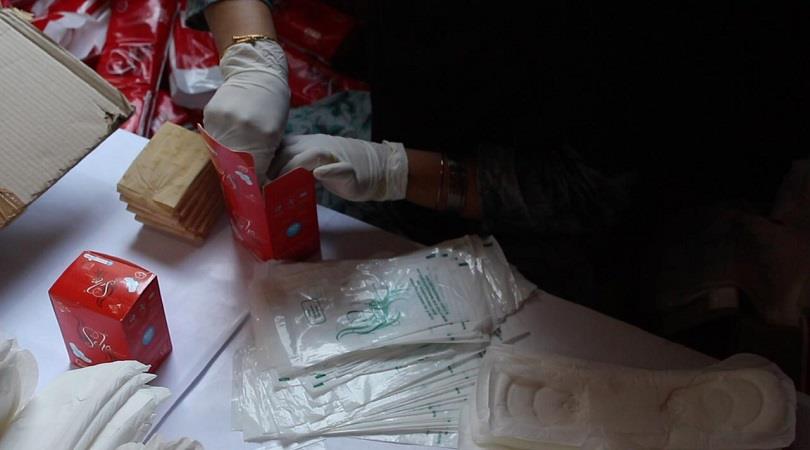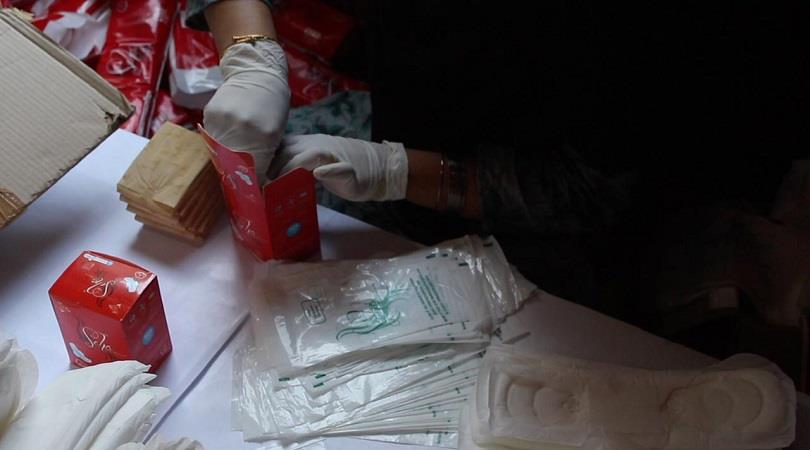
Not a Whisper: Need for Feminine Hygiene Renaissance in Kashmir
By Anam Mukhtar
'PERIODS,” a familiar name to describe the biological cycle that sustains lives, is often villainised in Kashmiri society. It is a“taboo” to openly discuss this monthly natural process that women undergo. On the face of it, people often brush aside calls for a more“open-minded” approach towards women's issues as an unnecessary western import or just some women ganging up to promote“liberal” values in society.
What such discussions often overlook is that such taboos are not trivial matters. Silence around matters of feminine hygiene and reproductive health have grave effects. This silence systemically sidelines concerns of women and discourages health initiatives in the direction. Talking about women's reproductive health facilitates their access to better health avenues.
It is no surprise that data points from recent times have painted an alarming picture around women's reproductive health in Kashmir. Dropping fertility rates, alarmingly high C-sections and the presence of reproductive disorders are obvious indicators of the volcano of issues that's brewing.
Feminine hygiene products are essential in the direction towards allowing women to have access to better health. A rough estimate of the percentage of women who use sanitary pads in India is 42%. The stats go even lower for a place like Kashmir, where the rationale behind why sanitary products are out of reach is rooted in many factors. It goes without saying that for most downtrodden families, sanitary napkins don't comprise essentials. This is problematic primarily because of its pronounced repercussions of increased urogenital infections, fungal infections, rashes, and cervical cancers. According to the National family and health survey, 62% of women use cloth instead of a sanitary pad during their period cycle in Jammu and Kashmir. This is a minuscule perceptible part of a problem that lingers in Kashmir. 51% of females in Kashmir go through insufferable cramps, of which 10% have erratic periods. PMS (Premenstrual syndrome) is a disorder that people corner as being almost non-existent. Downplaying these health issues causes distrust as well as distress amongst women which only strengthens the toxicity bred in the bone.
Kashmiri society influences women to button their lips around menstrual hygiene, further glorifying the quiet around it. The society robs women of their voice to raise a concern about their health, especially when it's female-centric into the bargain. We must defy such cultural obligations that threaten to jeopardise our health to preserve a supposedly civilised society. What is ironic is that the very act of depriving women of the right to know the ways to safeguard their bodies is uncivilised.
About 23 million girls drop out of school every year in India after their first period. This figure defines a lack of strategic planning on the part of the government. The government of India hasn't pulled out all the stops to achieve equitable access to hygiene products; however, a myriad of women are doing their utmost to resolve the issue. Kashmiris need to rise above the dangerous cult of the appropriation of preposterous and toxic corporate businesses that promote needless taxation on sanitary napkins. The study conducted in 2018 revealed that while the reduction in the 12% tax on pads set under the goods and services act brought some reassurance to women, this is just a drop in the bucket.
It is disheartening to learn that the organic pads aren't promoted and industrialised by the corporate giants like the other toxic pads that find their way in every advertisement. These high-end brands for sanitary pads should be the least preferable because they include dioxin that can pose a considerable danger by causing pelvic inflammatory diseases and endometriosis. Most of these pads have rayon instead of cotton that contain dioxin. Pads used by the majority of women in Kashmir are manufactured with the usage of plastics that breed yeast and bacteria due to restricted airflow to the vaginal area. Scented sanitary pads that neutralise the odours might seem favourable, except they harbour chemicals that enter the bloodstream and cause unsettling reactions.
With the soaring medical information on the alternatives, reusable cloth pads without any harmful agents see a rising demand among the knowledgeable. A more cost-effective choice is a menstrual cup that doesn't need to be bought every month and is more convenient to use. The question is whether women cause a threat to the economy. Well, yes, but not how you might think it is. The women employees and the young girls are a powerful plinth upon which the future of our country is based. The decrease in the women's workforce will only further the economic disruption, so safe access to feminine hygiene that depicts the presence of females in the industry is essential.
There's no quick fix to this socially ingrained taboo that makes women insecure for a natural process like periods. However, public toilets can be fitted in with pad dispensers that should be free of cost to help women suffice the much needed sanitary requirements. It isn't as much an issue of lack of awareness as it is about the unavailability of sanitary resources that we need to deal with. The improper disposal of sanitary pads is one reason why women keep them for longer than is advised. This isn't the only issue regarding feminine hygiene because unhygienic public toilets are key triggers for urinary tract infections that put women at risk of contracting diseases. In addition to raising a petition for building and maintaining clean toilets, the pads must be provided free of cost to the impoverished, which make up the majority of the valley.
Irfana Zargar is a pioneer in this direction as she hands out free sanitary pads to young girls in the city. Peerzada Aquib Nazar has broken the record by supplying organic sanitary pads across the valley at nominal prices. These initiatives reflect a change that's coming from within. This inventiveness by young Kashmiris sticks out in a place like Kashmir.
Samba district is one of the first places from Jammu and Kashmir to have made their local low-cost pads. The NGOs and social activists across Kashmir are blowing the lid off the silence on feminine hygiene to bring about a holistic change in the minds. There's a structured way to hamper such problems in our society, starting from education, prioritising, formulating and giving meaning to such inspiring visions. The only way out of this devastation is to know that it's not a woman's problem only. Inclusive efforts will make a difference.
Views expressed in the article are the author's own and do not necessarily represent the editorial stance of Kashmir Observer
- The author can be reached at [email protected]

Legal Disclaimer:
MENAFN provides the
information “as is” without warranty of any kind. We do not accept
any responsibility or liability for the accuracy, content, images,
videos, licenses, completeness, legality, or reliability of the information
contained in this article. If you have any complaints or copyright
issues related to this article, kindly contact the provider above.



















Comments
No comment